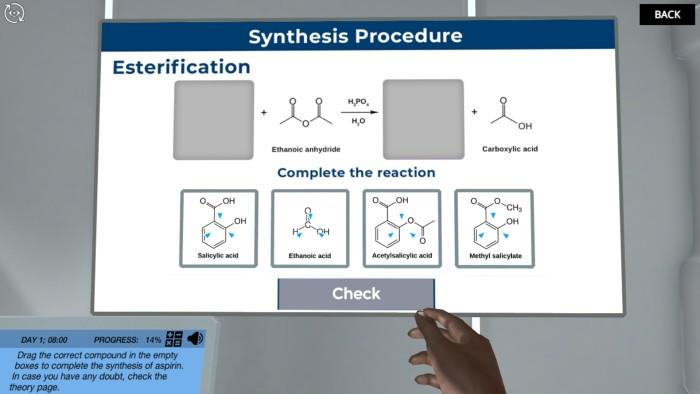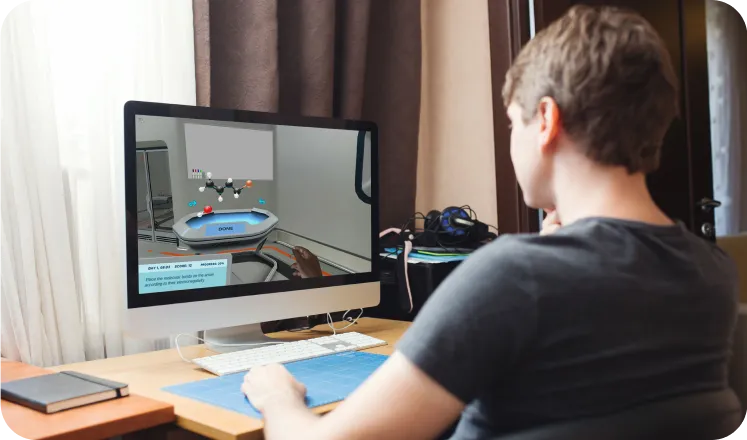
Just make your students imagine that they have a headache, and they reach for a pill to make it disappear. Chances are that pill is aspirin! But have they ever wondered how it's made? As you begin this interesting discussion in your next class, we’ll advise you to adopt practical approaches to make the lessons less theoretical and more engaging.
Aspirin is created through a cool chemical reaction called esterification. It's like mixing two ingredients to make a special compound. In this case, we mix something called salicylic acid with a fancy group called acetyl. When they combine, they form a powerful compound known as “acetylsalicylic acid”, which we call aspirin for short.
As you explain this and more detail, we’ll provide you with a list of 5 creative ways that can make the classroom teaching more interactive.
Educators can rely on interactive models and simulations to deliver ideas about aspirin synthesis. Simulation tools allow students to perform the synthesis process virtually in case of a lack of chemistry lab and infrastructure. Also, interactive 3D models can provide a visual representation of the molecular structure of aspirin and its synthesis pathway, aiding in better comprehension.
Labster’s Aspirin Synthesis Simulation renders a virtual laboratory experience where students can be engaged in a modern pharmacy setting, where they assist Marie the pharmacist in synthesizing extra aspirin to combat headaches during the exam period.
The simulation not only provides the theoretical exploration of esterification reactions, and the history of aspirin but also builds a solid foundation for this Organic Chemistry topic.
Another great way to objectively teach about aspirin synthesis is by using games and activities that can engage students as they learn. Labster provides an enhanced learning experience of Organic Chemistry by incorporating ‘gamification elements’ into its simulations as testified by Chemistry Prof Steve Gillet from Belgium.
The Aspirin Synthesis Virtual Game could serve as a tool as it would allow students to gain hands-on experience with synthesis techniques and equipment that would otherwise be inaccessible due to cost and space constraints. And the gamified approach captures students' enthusiasm while simultaneously enhancing their learning experience.

Discover Labster's Aspirin Synthesis virtual lab today!
Advancement in technology has rendered teaching abstract and content-rich topics like aspirin synthesis easier in modern times. There are various ways in which educators can infuse technology into study plans while teaching students about the synthesis of aspirin:
By incorporating these technological interventions, students can have a more interactive and personalized learning experience, enabling them to grasp the synthesis of aspirin innovatively and engagingly.
Students can be motivated to learn about aspirin synthesis by making them realize its importance in one’s career prospects. As educators, it becomes our primary duty to teach topics with such fluency that students can translate theory into practice when they enter the real world.
Aspirin synthesis can be made more relevant by inviting guest speakers and industry professionals from the pharmaceutical or healthcare industry to share their experiences and career journeys related to drug synthesis. As they highlight the importance of aspirin, its applications, and the skills needed for a career in pharmaceutical research or development, students might appreciate the topic more than before. Another way to connect the dots is to involve students in industry studies where you can underscore the career opportunities available in drug formulation, quality control, and regulatory affairs.
Alternatively, you can introduce your students to Marie, the virtual pharmacist of Labster’s Aspirin Synthesis Lab who can help them with the intricacies of synthesis and related stuff.
The topic of aspirin synthesis can be made more meaningful and engaging for younger audiences by highlighting its importance for the healthcare system. You can briefly discuss how aspirin is utilized in the prevention and treatment of cardiovascular diseases, pain management, and inflammation. In this way, your students can grasp its impact on patient health and the pharmaceutical industry.
Another way of showing the relevance of aspirin synthesis to real-world issues could be by sharing recent research updates and insights from its role in drug development and clinical trials.

The role of aspirin in healthcare can’t ever be overemphasized which makes teaching this topic with clarity to next-generation scientists (i.e. our students) of prime importance in school and college curriculums. By utilizing the above-listed ways, educators can make the students delve a little deeper and make them understand why they should be clear about all the little intricacies involved in the topic.
Labster extends its help via its Aspirin Synthesis Virtual Lab where students from all socioeconomic and geographic backgrounds can perform the procedure without any hurdles of fund crisis or lack of organic chemistry lab infrastructure. We, here at Labster, call for the right to knowledge to all students across the globe!
Try our free 30-day All Access Educator's Pass today and play the Synthesis of Aspirin simulation alongside 300+ other virtual labs!

Labster helps universities and high schools enhance student success in STEM.
Request DemoRequest a demo to discover how Labster helps high schools and universities enhance student success.
Request Demo